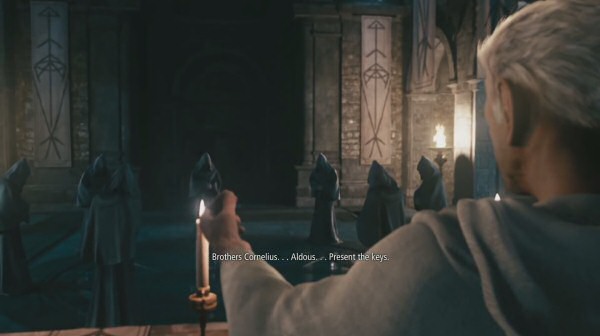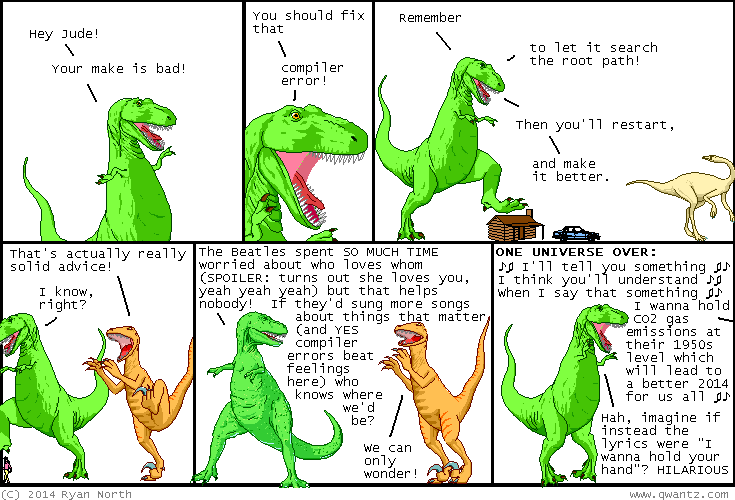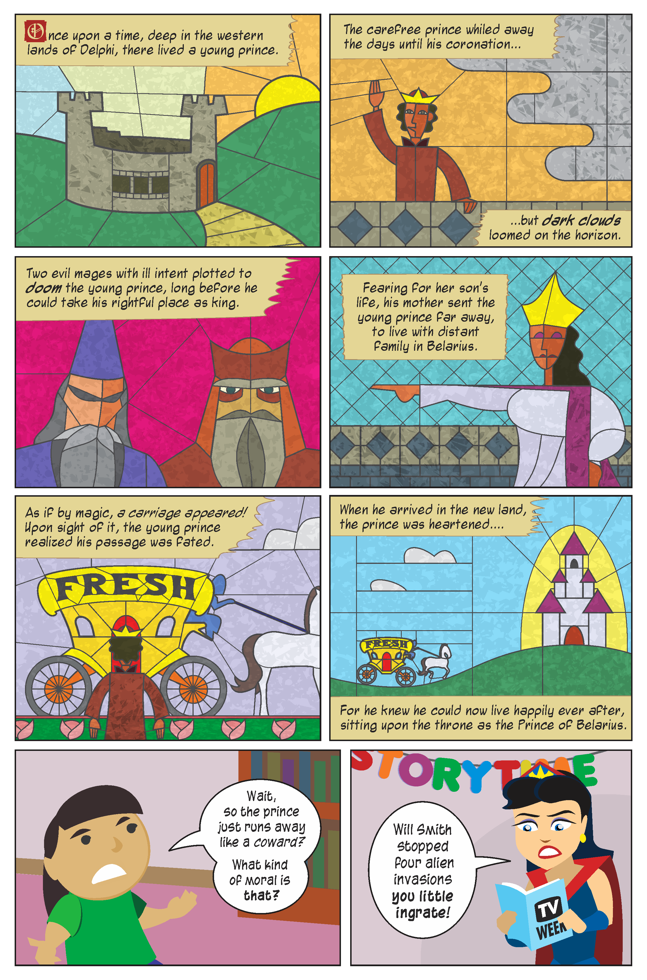Shared posts
Lucky Penny featured in io9's "51 awesome webcomics the Eisners have completely failed to recognize"
Hey, so this is neat: Lucky Penny was featured on a list of comics that the Eisners completely failed to recognize! I'm not a particularly outspoken person, and this isn't a knock on the comics that ARE nominated, but: year after year I rarely recognize the nominations in the digital comics category... a category that ought to be flush with nominations for my peers and long-running predecessors. It is unfortunate.
We're slowly chugging away on these comics-- we have a lot of new things in the works this year, and I'm hoping that we're successful in pulling it off! I hope you're all doing well... have a nice weekend, and we'll catch you next week!
Thief Autopsy Part 1: Prologue
So Thief has come and gone. Based strictly on how much discussion it’s generating, I estimate that upwards of six people bought it. It’s not generating buzz the way Tomb Raider or Human Revolution did. It’s not generating controversy the way Duke Nukem Forever did. And it’s not getting public derision the way Aliens Colonial Marines did. The game is barely a month old, and the conversation is basically over already. 6.9/10. Meh. Which is a shame. This game is not nearly the train wreck that Aliens: CM[16] was, and I hate to see it forgotten so soon.
So let me do my part by meticulously picking at the game and pointing out all the flaws. Partly because in the world of games it’s better to be criticized than ignored, but mostly because that’s what we do here.
The various appendages of this game simply don’t fit together. Normally I blame these kinds of problems on bad writing, but in this case I think the game suffers from a severe case of re-writing and script tampering. Examining the story feels like an archaeological dig where we try to figure out what era the disparate pieces belong to.
 |
We start off with a little tutorial where we slink from one apartment to another while the game teaches the player how to sneak, extinguish lights, loot stuff, etc. Once the player has the basics down, we hear pounding footsteps on the roof outside. It’s time to meet our woman in the fridge.
Their introductory dialog:
Garret: Care to make a little more noise next time?
Erin: How else would you know it was me? (Beat.) Basso did tell you we were working together on this, right?
Garret: Well I showed up, didn't I? What do you think?
Erin: I think you haven't changed a bit.
Gah. It’s not the worst dialog I’ve ever heard, but there’s definitely something wrong here.
 |
| I like to think the game designer reviewed this scene with the level designer and threw up his hands in frustration, "You fool! I can still detect faint traces of blue in the skybox. The design document clearly calls for low-contrast brown with complete uniformity, yet I can still differentiate between foreground and background elements. I can even see this incredibly important central character without needing to squint very hard, you complete hack!" |
She says: “How else would you know it was me?”
Wait, is she taking pride in being noisy? And is she suggesting that she’s so notoriously and uniquely noisy that it’s kind of a calling card? Or is this supposed to be sarcastic? At first I assumed her dialog would be clearer once we get to know her character, but I’ve been through the whole game and I still can’t tell what this was supposed to mean.
He says: “Well I showed up, didn’t I? What do you think?”
Again, you could take this either way:
- I dislike you so thoroughly that I would never work with you, therefore my showing up serves as proof that Basso didn’t tell me you were involved.
- I wouldn’t have known to meet you here if Basso hadn’t told me, therefore my showing up serves as proof that Basso did tell me you were involved.
This is kind of an important distinction. This dialog exists to establish their relationship, but it’s not working because I don’t know what either one of them is trying to say.
She says: “I think you haven’t changed a bit.”
This is a standard screenwriter shortcut for “Okay, I’m done showing you these two people know each other, time to exit the conversation.” But since the previous dialog didn’t make any sense, we don’t know what to make of this. What aspect of his character “hasn’t changed”? He doesn’t know what’s going on? He’s hostile towards Erin? Grumpy? Difficult and obtuse?
This is a running theme in their dialog throughout the game. It’s both incredibly cliche while also failing to give the viewer anything to work with, character-wise. It’s confusing. And not in a “mysterious” way, but in a “muddled and distracting” kind of way. My guess is that this dialog has been written, re-written, re-organized and re-cut as the team fussed with the story, and the constant edits turned what was probably envisioned as straightforward “friendly rivalry” banter into this complete hash.
This is the start of the antagonistic relationship between Erin and the player. During the rest of the tutorial Erin uses every moment of screen time to make herself as unlikable as possible.
- She pretends she’s going to hand Garret a piece of paper, but at the last second she the drops it on the floor so he has to stop and pick it up. In real life this isn’t a terrible thing, but in the context of a movie this sort of behavior is usually performed by a villain. The writer has someone act like an ass to make it easier to for the audience to hate them.
- She murders a young guard, instead of knocking him out. Keep in mind that in the Thief universe, murder is portrayed as the work of an amateur. The game isn’t just telling us she’s a bad person, it’s also telling us she’s a terrible thief.
- She repeatedly insults Garret. It’s not playful buddy-cop “just like old times” kind of stuff, but more like watching a divorced couple trade barbs. And since Garret is trying to get her to show restraint and be a thief, it’s pretty natural to expect the player to take his side.
 |
This character is about to exit the story and I assume we’re supposed to feel something about that when it happens, but I have no idea what the writer is trying to do here. There is no warmth or friendship between these two. There’s not even respect. If I hadn’t known where the story was going, I would have assumed it was setting her up to be some sort of backstabbing villain. She’s certainly not sympathetic.
Erin uses this claw-thing to scale walls. It lets her reach places that Garret can’t, but he claims it’s “holding her back”. I assume he means emotionally / professionally and not in a practical sense, because it really does seem like a good tool. After yet another argument Garret pickpockets the claw from her.
They get to the manor where a bunch of cultist guys are doing a cultist thing. Garret and Erin are up on the roof, looking down on the proceedings through a giant domed skylight. Main elements of the scene:
 |
- The Baron, an industrialist and the nominal leader of the city. He’s leading the ceremony.
- A book with a gear on the cover and a lock over it.
- The primal stone, a glowly sea-green thing that’s used to unlock the book. This is what we were supposed to steal.
- The ceremony summons a vortex of green light and smoke while the Robe Guys chant.
Garret and Erin bicker some more. The Thief-Taker General (the Sheriff, basically) is down on the street, but sees the two thieves on the roof. Then a few seconds later he’s somehow up on the roof with them. Erin ends up falling through the window and right into the vortex. Garret swings down. It looks like he falls, but it also looks kind of like he’s trying to rescue her? Maybe? The roof collapses and the scene is cut off.
This doesn’t feel like a proper ending to the scene. It’s not a fade to black or a cliffhanger, because it cuts off the music and sound. It’s more like someone pausing a DVD than a scene transition. A proper scene ending would have the music build to a crescendo before ending, and it would hang at a black screen for a few seconds. Instead we go from mid-musical note to a completely silent loading screen.
My theory here is that during development this scene was written and re-written. I’m betting there was more action after the ceiling collapse, but those events were removed from the story and the cutscene was messily truncated rather than properly re-editing it.
We’re off to a strange start, and while the gameplay improves the story is pretty much downhill from here. Buckle up.
Why engine programmers are the best.
But why? Why are engine programmers the best?
In my opinion, the reason why people see engine programmers as the best could be down to results. Engine programmers - and graphics programmers - often get given impossible missions, then somehow manage to pull it off. They get asked to reduce resource usage, then get told the ratio, something like "Hey, you know we allocate about 1GB for resources, well, we want an iPhone version, and we need to get it down to 50MB", or "This game looks great on the XBox and the PS3, but can you make it look just as good on the Wii?" These are obviously things that are impossible. These are things that engine programmers normally see as challenges. Once the stage is set, these programmers will make strange movements, cut resources by half, or in four, will reorder the rendering, will adjust the way the system works to squeeze out the last bytes and cycles. Generally they are seen as gods and heroes because they don't just do the impossible, but they do it repeatedly.
Well deserving of their praise are the engine programmers, for they are the bringers of savings, the enablers of features, the gods of getting it done, and the princes of performance over politics.
But they have it easy. They have the benefit of a restricted set of inputs, outputs, and they are allowed to do things any way they like, as their how, their implementation, is not seen by the user. There are other branches of development that are much more scary; often those developers don't get the praise they deserve.
Game-play programmers have to work with a constantly evolving design. Game-play code often starts out very clean and the design of the game is often reflected in the code. As the design changes, those changes bend the code into the mess we learn to hate. This constant evolution can leave the code base in a bad state, building up technical debt, ultimately leading to a horrible mess of code that does what the game-play programmer expects, but only in the situations they had thought of. Bugs creep in everywhere, slow down the development of the game, and usually someone is blamed for bad coding practice when all they were doing really was just trying to keep up with the engine programmers.
Then there is the User interface programmer, who usually has to work with UI frameworks, because style must be consistent, even if the interaction with the framework is not. Linking callbacks to states, and states to visuals, and visuals to input possibilities. UI has to show state when it changes, such as toasts, health bars, dialogue, and modal dialogues. They are in charge of making sure you see the achievement or trophy, without distracting you from the game. They have to work with constantly moving data (the game's state is always in flux) and moving output format (usually a high level designer will make sweeping changes that affects how the data is transformed into the on screen representation, and then complain when told it will take more than one day to put in an extra column on a scoreboard). The UI programmer faces the same challenges as the game-play programmer, the same crazy design changes, but without the kudos of it being part of the game. Can you name one famous UI developer?
Then we get to the dirtiest of programming jobs: the network programmer. Like an engine programmer, they have to do the impossible. They have to link up multiple machines, keeping the latency down while managing to keep everything synchronised, working with the same or similar crazy race conditions you face in multi-threaded code. They have to change everyone else's code so it doesn't reference other entities by pointers, doesn't waste space or bandwidth, or take a too long a time to figure out what needs to be sent in the first place. These gods of high latency shared state are obviously doing something extremely complex, but you don't often see much being said about them. Maybe that's because they are too busy fixing bugs that you just introduced by changing something in the player state based on an unsynchronised global variable. Sure, maybe you can name one network game developer, but do they have any hair left?
Oh, I guess there is always the guy that does all of those things at once, but indie game developers get a lot of kudos. So at least there is that. Still, I think most people would like the easy life of doing the impossible, to a slow moving specification, with obvious visible results. Most people would probably like to be the engine or graphics programmer. Because they are the best.
one universe over someone writes a love song and everyone looks up from their build files, their minds: blown
| archive - contact - sexy exciting merchandise - cute - search - about | |||
 |
|||
| ← previous | February 18th, 2014 | next | |
|
February 18th, 2014: GUYS you know what comes out tomorrow? The Midas Flesh #3! I wrote it and Shelli and Braden drew it and if you like the Adventure Time comic (which we also create!) we think you'll like this too! You can read more about the book here, read the first few pages of the comic here, get the book at your local comic store, or get digital copies! Man look at all those links! MY advice is to probably click at least one of them!! One year ago today: pride and prejudice and printing errors – Ryan 
| |||
Dirt, crayon, play-doh, bonfire perfume
Demeter perfumes generally smell exactly like what’s on the bottle. “Chocolate Chip Cookie” smells eerily like a freshly-baked cookie. “Tomato” smells exactly like a tomato, which is fine, if that’s what you want. And “Bonfire” smells like you’ve been outside next to a pile of burning wood.
But I’ve always been mystified why you’d want to put on their “Dirt” fragrance. It smells like dirt from the ground. Or “Cannabis Flowers.” Or “Suntan Lotion.” Or “Poison Ivy.” And now they have a “Play-Doh” scent. And “Crayon.” That’s actually what they smell like, too. Who is wearing crayon? Where do you wear crayon?
(autotune voice) IM IN THE CLUB SMELLIN LIKE CRAYON
Pen Flatware
“Ever found yourself sitting at your desk all set to eat lunch and realize you have no utensils to use?” Yes, but you could keep a plastic fork in your desk, or a metal one, and not have to attach $8.49 worth of third-party pen caps to ballpoint pens and then have to use ballpoint pens to lift food to your mouth.


